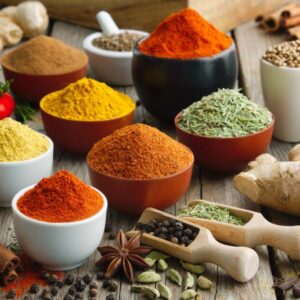 Seasoning food can transform a simple dish into an elevated culinary experience! Herbs and spices add depth, complexity and character to everyday meals. Yet using too much or the wrong flavoring for your ingredients can spell disaster.
Seasoning food can transform a simple dish into an elevated culinary experience! Herbs and spices add depth, complexity and character to everyday meals. Yet using too much or the wrong flavoring for your ingredients can spell disaster.
To season like a pro, it’s essential to understand the flavor profiles of various herbs and spices, and how to use them effectively.
The Basics of Spices and Herbs
Spices are derived from the roots, bark, seeds and fruits of plants, while herbs come from the leaves. Learn about some of the more commonly used ones, including their flavor profile and influence on certain cuisines.
1. Black Pepper
Flavor Profile: Piney, sharp and slightly spicy
Black pepper is a versatile spice that can be used in almost any savory dish. It enhances the flavor of meats, vegetables, soups and sauces. Freshly ground black pepper has the most potent flavor.
2. Cumin
Flavor Profile: Warm, earthy and nutty
Cumin is commonly used in Middle Eastern, Indian and Mexican cuisines. It pairs well with beans, lentils, rice and meats, adding depth to chili, curry and taco seasoning.
3. Paprika
Flavor Profile: Ranges from sweet to smoky and spicy
Paprika is a key spice in Hungarian and Spanish cooking. It’s great for seasoning meats, stews and roasted vegetables, as well as adding color to dishes.
4. Turmeric
Flavor Profile: Slightly bitter, spicy and peppery
Turmeric is a key ingredient in Indian and Southeast Asian cooking, often used in curries, rice dishes and soups. It’s vibrant yellow hue also makes turmeric a natural food coloring.
5. Coriander
Flavor Profile: Floral, citrusy and mildly sweet
Coriander seeds are commonly found in South Asian spice blends like garam masala and curry powder. Ground coriander is often used to season roasted vegetables, marinades and salad dressings.
6. Oregano
Flavor Profile: Pungent, earthy and slightly bitter
A staple in Mediterranean and Mexican cooking, oregano is used in tomato-based dishes, grilled meats and as a pizza topping. Dried oregano is more powerful than fresh leaves.
7. Basil
Flavor Profile: Sweet, peppery and slightly minty
In Italian cooking, basil is essential for pesto, pasta sauces and salads. Fresh leaves have a more vibrant flavor than dried basil.
8. Thyme
Flavor Profile: Earthy, slightly minty and citrusy
Thyme is a versatile herb that pairs well with meats, soups and roasted vegetables. It’s an ingredient often found in French and Mediterranean recipes.
9. Rosemary
Flavor Profile: Woodsy with notes of pine, pepper and citrus
A staple in Mediterranean cooking, rosemary is a robust herb that pairs well with roasted meats, potatoes and bread.
10. Ginger
Flavor Profile: Spicy, warm and slightly sweet
Ginger is often used in Asian, Indian and Caribbean cuisines. It adds zest to stir-fries, curries and baked goods. The fresh root has a more intense flavor than ground ginger.
Tips for Using Spices and Herbs
Once you have an understanding of their flavors, here are some tips to incorporate popular herbs and spices into your cooking.
- Start with Small Amounts: It’s easier to add more seasoning than to fix an over-seasoned dish. Start small and keep making minor adjustments to taste.
- Toast Spices: Using a dry skillet, toast whole spices to release the oils and enhance the flavors. This can be very effective for spices like cumin, coriander and fennel.
- Combine Spices: Create your own spice blends to add complexity to dishes. Classic blends include garam masala, adobo and herbes de Provence.
- Use Fresh Herbs Wisely: While dried herbs can withstand longer cooking times, fresh herbs should be added at the end of cooking or as a garnish to preserve their flavors.
- Balance Flavors: Consider the overall flavor profile of your dish. For example, balance the heat of chili peppers with sweet paprika.
Create flavorful, aromatic dishes that will impress the guests at your next dinner party! When you need a break from cooking, Colony Diner will be here to serve you a delicious meal. View our menu!






